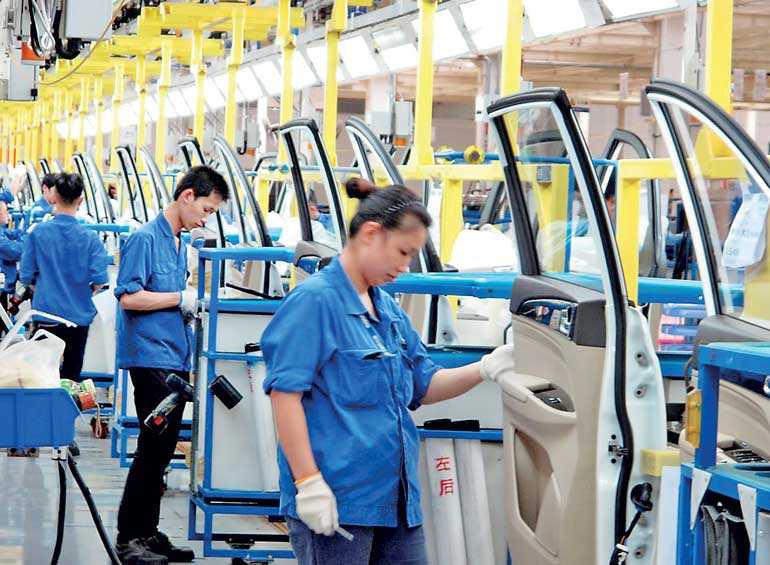Tuesday Feb 17, 2026
Tuesday Feb 17, 2026
Tuesday, 4 December 2018 00:00 - - {{hitsCtrl.values.hits}}

LONDON/TOKYO (Reuters): Global economic prospects appear gloomy as year-end approaches after factory activity and export orders weakened in November, prompting analysts to predict no quick rebound amid persistent global trade tensions.
In a sign that corporate sentiment is taking a hit from the worries over protectionism, manufacturing activity slipped in November in countries as varied as France, Germany, Indonesia and South Korea, IHS Markit Purchasing Managers’ Indexes showed on Monday.
British factories bucked the trend but the approach of Brexit was felt as companies stocked up on parts to counter any border delays, while exports suffered a rare back-to-back fall.
US data due out later on Monday are expected to show that factory growth in the world’s largest economy remained robust last month but eased slightly from October.
And although factory activity rose slightly in China, new export orders extended their decline in a further blow to a sector already hurt by a US-led trade war.
However, global shares rallied on Monday after US and Chinese leaders meeting at the G20 summit in Argentina at the weekend agreed a truce in their trade conflict, offering some reassurance on the economic outlook.
But analysts said the 90-day deadline the two sides agreed upon to reach a deal meant a conclusive resolution of the row remained distant.
“Other than the tariff deferral... little else of substance was agreed,” RBC economists told clients.
“Tellingly, no joint statement was released, with both sides instead releasing their own statements on the outcome which illustrate the gap that still exists between them.”
A darker outlook in the euro zone is linked to the trade war, which is damaging global growth and intensifying political uncertainty in the currency bloc, IHS Markit said.
New orders fell for a second month in the euro zone and factory managers see no sign of any early pickup, meaning optimism remains low.
Manufacturing activity in the currency bloc expanded at its weakest rate in more than two years in November as orders contracted for a second month, further evidence that euro zone economic growth is past its peak.
Britain’s PMI proved stronger than all forecasts in a Reuters poll of economists but was still one of the lowest since voters decided in a referendum in June 2016 to leave the European Union.
Deep uncertainty over the future pushed many British manufacturers to build up inventories of parts to protect themselves against the risk of customs delays at the border when Britain leaves the EU on 29 March. “We expect economic momentum to cool over the winter as wider investment stalls, and consumers become even more cautious,” said James Smith at ING.
“For manufacturing specifically, the external environment poses further challenges as euro zone momentum slows and trade tensions remain elevated.”
India’s factory activity in November expanded at the fastest pace this year, buoyed by a rise in domestic and foreign demand that allowed firms to raise prices.
Yet China’s manufacturing sector activity grew slightly in November as export orders shrank, reflecting weakening global demand, its PMI showed.
The downbeat readings backed Friday’s official PMI survey for November showing growth in China’s vast factory sector sliding to its lowest in more than two years.
South Korean factory activity in November contracted again after two brief months of growth as new export orders shrank by the most in over five years, a sign of increasing pressure on businesses from slowing global demand.
A revised survey showed Japan’s manufacturing activity expanded in November at the slowest pace in more than a year as growth in new orders slowed, a worrying sign economic expansion may be muted in the fourth quarter.
“The underlying picture remains subdued, with momentum tilting towards a slowdown,” said Joe Hayes, economist at IHS Markit, which compiles the Purchasing Managers’ Index.
The survey results came on the heels of data out earlier on Monday showing a sharp slowdown in Japan’s capital expenditure, which had been considered a key driver of the export-reliant economy.
Japan’s economy shrank an annualised 1.2% in July-September as natural disasters and slowing global demand hurt factory output and exports.
Monday’s capital expenditure reading could mean revised gross domestic product (GDP) data due next week will show the economy shrank more than first calculated, analysts say.
“The contraction in July-September GDP could be deeper than the preliminary reading,” said Toru Suehiro, senior market economist at Mizuho Securities.
“External demand is weakening since the start of this year on slowing global growth, so it’s hard to expect Japan’s economy to strengthen much. The economy will likely stall for the time being,” he said.